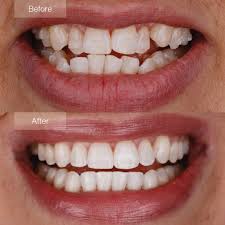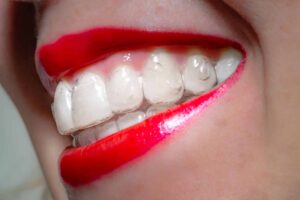Veneers
Veneers are thin, custom-made shells of tooth-colored materials, typically porcelain or composite resin, designed to cover the front surface of teeth to enhance their appearance. They are often used to address various cosmetic issues, such as discoloration, chips, gaps, or misalignment. The process usually involves minimal tooth reduction, allowing the veneers to be bonded securely to the teeth for a natural look. With proper care, veneers can provide a beautiful, long-lasting smile enhancement, making them a popular choice in cosmetic dentistry.
Why Choose Veneers?
Here are four reasons to choose veneers:
The application of veneers typically requires only a small amount of tooth reduction, making the procedure less invasive than crowns or other restorative options.
Veneers can dramatically enhance the appearance of teeth by correcting issues such as discoloration, chips, and gaps, resulting in a more uniform and attractive smile.
Made from high-quality materials like porcelain, veneers are resistant to stains and can last for many years with proper care, providing a long-term solution for cosmetic dental concerns.
The process of getting veneers is relatively fast, often completed in just a couple of visits, allowing patients to achieve their desired smile in a short time frame.
How Do Veneers Work?
Consultation and Planning
The process begins with a comprehensive consultation, where the dentist evaluates the patient's teeth and discusses aesthetic goals. Impressions or digital scans may be taken to design custom veneers that suit the patient's smile.
Tooth Preparation
During the next appointment, a small amount of enamel is gently removed from the front surface of the teeth to ensure a proper fit for the veneers. This step may involve local anesthesia for patient comfort.
Veneer Fabrication
After tooth preparation, impressions are sent to a dental lab, where the custom veneers are fabricated. This process usually takes about one to two weeks, during which temporary veneers may be placed to protect the prepared teeth.
Veneer Bonding
Once the custom veneers are ready, the dentist bonds them to the teeth using a strong adhesive. The fit, color, and appearance are carefully checked, and any adjustments are made before the final bonding process, resulting in a beautiful and natural-looking smile.
Hear from Our Satisfied Patients

“I couldn’t be happier with my veneers from ALBGTC! From the first consultation, the team made me feel comfortable and understood my goals. The transformation was incredible—I went from feeling self-conscious about my smile to beaming with confidence. I’ve received so many compliments, and I can’t thank the staff enough for their professionalism and care!”
– Samantha K.
“Getting veneers at ALBGTC was one of the best decisions I’ve ever made. The process was smooth, and the results exceeded my expectations. My teeth look so natural and vibrant, and I feel more confident than ever in social situations. I highly recommend ALBGTC to anyone looking to enhance their smile!”
– Daniel H.

FAQs
Veneers are typically made from either porcelain or composite resin. Porcelain veneers are more durable and stain-resistant, while composite veneers can be applied in a single visit and are usually more affordable.
With proper care and regular dental check-ups, veneers can last anywhere from 5 to 15 years or more. Their longevity largely depends on oral hygiene practices and lifestyle factors.
While veneers do not require special care, maintaining good oral hygiene practices—such as brushing, flossing, and regular dental visits—is essential for their longevity. Avoiding habits like grinding teeth or biting hard objects can also help prevent damage.
Most patients experience minimal discomfort during the veneer procedure, especially since local anesthesia is often used during tooth preparation. Any post-procedure sensitivity is usually mild and temporary.


